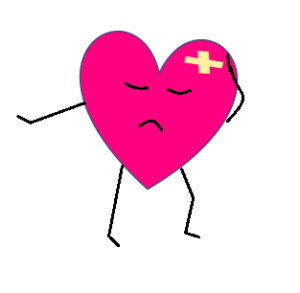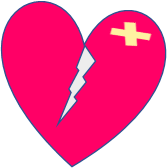 The heart is an organ that pumps blood for the movement of blood throughout the body via the circulatory system, supplying oxygen and nutrients to the tissues and removing carbon dioxide and other wastes.
The heart is an organ that pumps blood for the movement of blood throughout the body via the circulatory system, supplying oxygen and nutrients to the tissues and removing carbon dioxide and other wastes.
In Traditional Chinese Medicine, the heart system also includes the brain and the heart meridian besides the organ heart.
The heart is so important to the body that we die when the heart fails to pump blood. Taking special care of the heart is vitally important to our life. But many people are unknowingly damaging their hearts, making the heart disease the number one killer of our precious life.
- Sit for too long.
Sitting for hours or too much of any other sedentary activities with little or no vigorous movement increases the risk of cardiovascular disease. An inactive body causes slow blood circulation, resulting in declining heart functions and myocardial atrophy as time goes on. For the elderly with atherosclerosis embolism, slow blood circulation may also cause myocardial infarction and cerebral thrombosis.
Sedentary lifestyle and slow blood circulation will also lead to insufficient blood supply to the brain, resulting in the brain, mental, and spiritual damage, including mental aversion. The body may show the symptoms of tiredness, listlessness, yawning, groaning, or dizziness if standing up suddenly.
Thinking too much while sitting for a long time also consumes blood and the body’s yin energy. The elderly may also have memory loss, inattentiveness, and other concentration problems.
Consuming alcohol or caffeinated drinks stimulates and speeds up heart function. Consuming alcohol or caffeinated drinks at the same time of being sedentary causes less circulation but adds more work to the heart, resulting in much more burden on the heart.
Control sitting or other sedentary activities, such as watching TV, surfing or playing games online, working on a computer, to no more than one hour each time. Move around to get the circulation going. Control caffeinated drink intake to no more than one cup a day.
- Taking a hot sauna when your body is exhausted.
Taking a sauna when the body is exhausted becomes many men’s favorite way of relaxation. The high temperature makes blood vessels expand rapidly, causing over 3 times more blood flow to muscles and the outer body, resulting in more circulation work for the heart while it is tired.
One of the most dangerous situations is taking a hot sauna and drinking alcohol at the same time while the body is tired.
Elderly and the people with a heart or high blood pressure problem should not take the risk of having a hot sauna.
If nausea, palpitation, rapid heartbeat, and any other adverse reactions appear, stop sauna right away.
- Smoking, especially in a small and enclosed room.
The smoke from cigarettes may contain nicotine, carbon monoxide, and many other toxic substances. Smoking in a poorly ventilated room makes the body breathe in more toxins, leading to vasospasm, myocardial ischemia, severe arrhythmia, and even sudden death.
- Drinking coffee right after consuming alcohol.
Drinking coffee to sober up the sleepy body caused by overconsumption of alcohol increases the damage to the body from alcohol. The coffee stimulates the brain, making the brain change suddenly from shutting down to extreme excitement, and stimulates blood vessels to expand, greatly increasing the burden on the cardiovascular system. The damage caused by coffee will be much more than pure alcohol. Therefore, do not drink coffee when more than a shot of liquor or a cup of wine is consumed. Drink no more than one cup of coffee, if any, and at least 60 minutes after the consumption of alcohol.
- Getting up too suddenly in the morning or after an obstructed defecation.
6 am to 11 am is known as the “devil time” of cardiovascular and cerebrovascular disease that over 70% of the disease burst at this time. The cardiovascular system is weak and more vulnerable to disease in the morning.
While sleeping at night, the body is in a semi-dormant state. When the body just wakes up, the heartbeat changes from slow to fast and this may cause vasoconstriction and coagulation increase, resulting in thrombosis. Upon sudden raising up of the body, blood pressure is not high enough yet for the demand. Dizziness, nausea, limb weakness, and other low blood pressure symptoms may result. Therefore, after waking up in the morning, keep lying in bed for at least 3 minutes and move the body, especially four limbs and the head, before getting up.
Having difficulty and pushing hard to expel stools causes:
- strong contraction of abdominal and diaphragm muscles,
- lower blood pressure and resulting in cerebral hemorrhage,
- increased myocardial oxygen consumption and resulting in angina, myocardial infarction, both of which may cause sudden death.
Because elderly typically have poor vascular response and adjustment, sitting on the toilet for too long before quickly standing up can easily lead to transient cerebral ischemia, dizziness, vertigo, fall, or even cerebrovascular disease.
Don’t stand up or change our positions too suddenly to prevent heart disease.
- Exercise outdoors for too long in a foggy morning.
On a foggy day, dust, bacteria, and other harmful substances may be filled up in the air. Breathing the poisonous air into the body while exercise outdoors increases blood poisons, blocks the supply of oxygen in the blood, and may result in heart disease. Exercise indoors on a foggy day or exercise at other appropriate times. Do not stay in the fog for too long If you have to go out. Wearing a mask is recommended if you live in a highly polluted area.
- Having emotional troubles or overeating when you have emotional troubles.
Extreme or prolonged emotions hurt the body. All emotions affect the heart. Anger, for example, is a great threat to the health of our heart. With anger, the body will secrete many more hormones, which increase the contraction of blood vessels, leading to increased blood pressure, resulting in hypercholesterolemia and hyperglycemia.
 A study from the American Heart Association pointed out that the possibility of heart disease increased by 10 times within one hour of over-eating. It is even more dangerous for people who are already suffering from high cholesterol, high blood pressure, or diabetes.
A study from the American Heart Association pointed out that the possibility of heart disease increased by 10 times within one hour of over-eating. It is even more dangerous for people who are already suffering from high cholesterol, high blood pressure, or diabetes.
Keep calm, peaceful, and happy for a healthy heart. Never overeat.
- Taking a cold shower after exercise
Take a cold shower after sweat may make you feel comfortable. But your heart is more vulnerable to disease. After exercise, the surface of the capillaries expands. A sudden stimulation from cold water causes rapid contraction of blood vessels, increased blood pressure, and increased burden on the heart and lungs, resulting in palpitation, shortness of breath, dizziness, and other uncomfortable feelings. A person with a weak heart can easily lead to an acute heart disease. Do not take a cold shower immediately after a sweat. No winter swimming and other similar exercises.
- Opening the window of your car in a traffic jam.
More waste is released to the air from car exhausting systems in a traffic jam. Opening the window makes the poisonous air blow directly at the face for breathing in. The inhaled poisonous air gets inside the body and blood, burdening the heart, liver, and lungs.
Driving under a high stress and tension when caught in a traffic jam may lead to rapid heartbeat, myocardial fatigue, resulting in coronary heart disease.
In the case of traffic congestion, it is better to use the ventilation system to circulate air inside the vehicle than to open the window. Do not get mad or stressed under traffic or other conditions.
- Exercise vigorously that exceeds your heart’s stress level.
Exercising vigorously increases the body circulation and heartbeat and puts more work or burden on the heart. There are so many incidents of people dying from competitive sports, either regular people or athletes. Stop exercise if your heart beats more than 100/second or you have any discomfort in your chest area, shoulders, or your arms.
